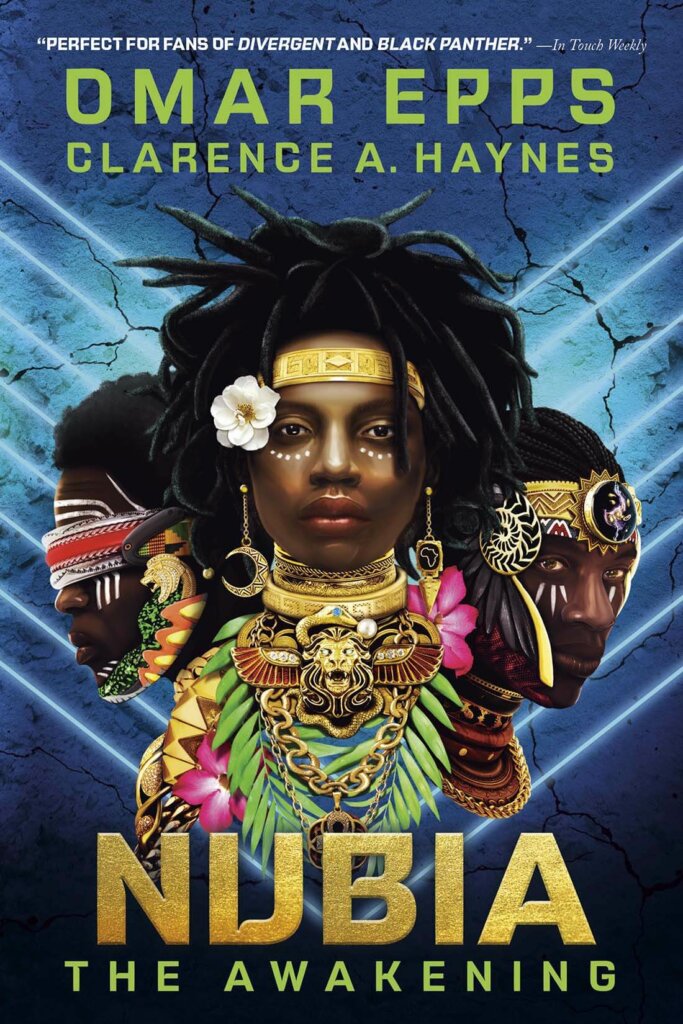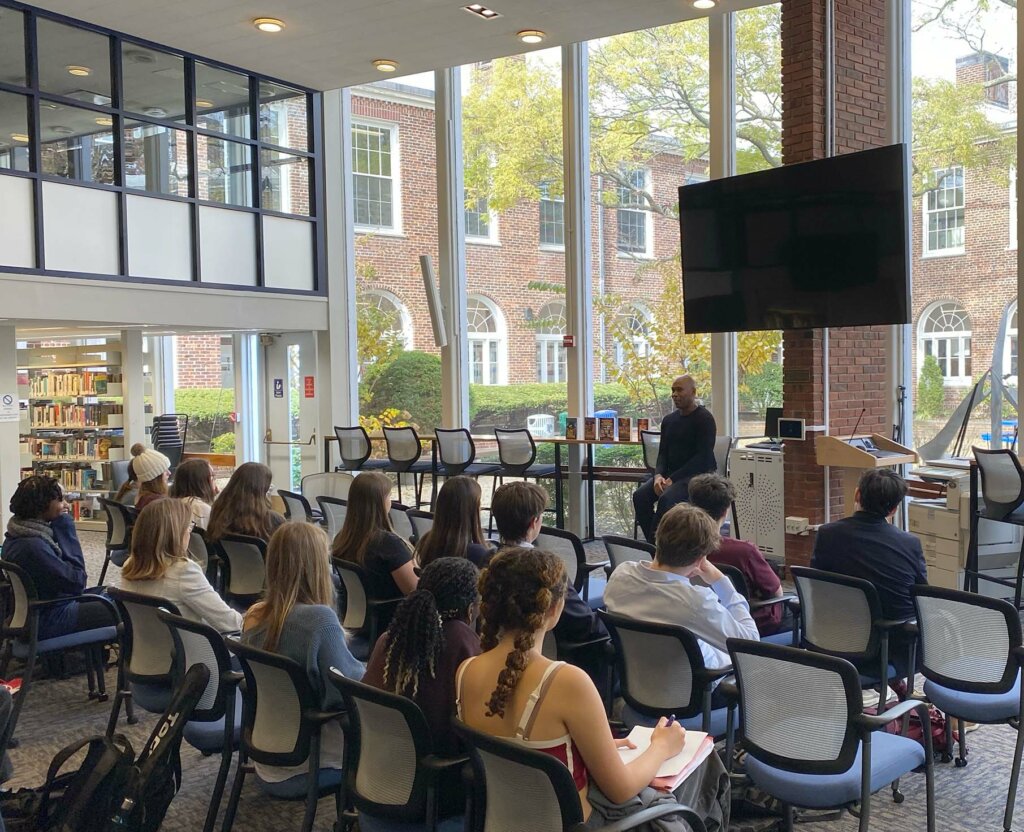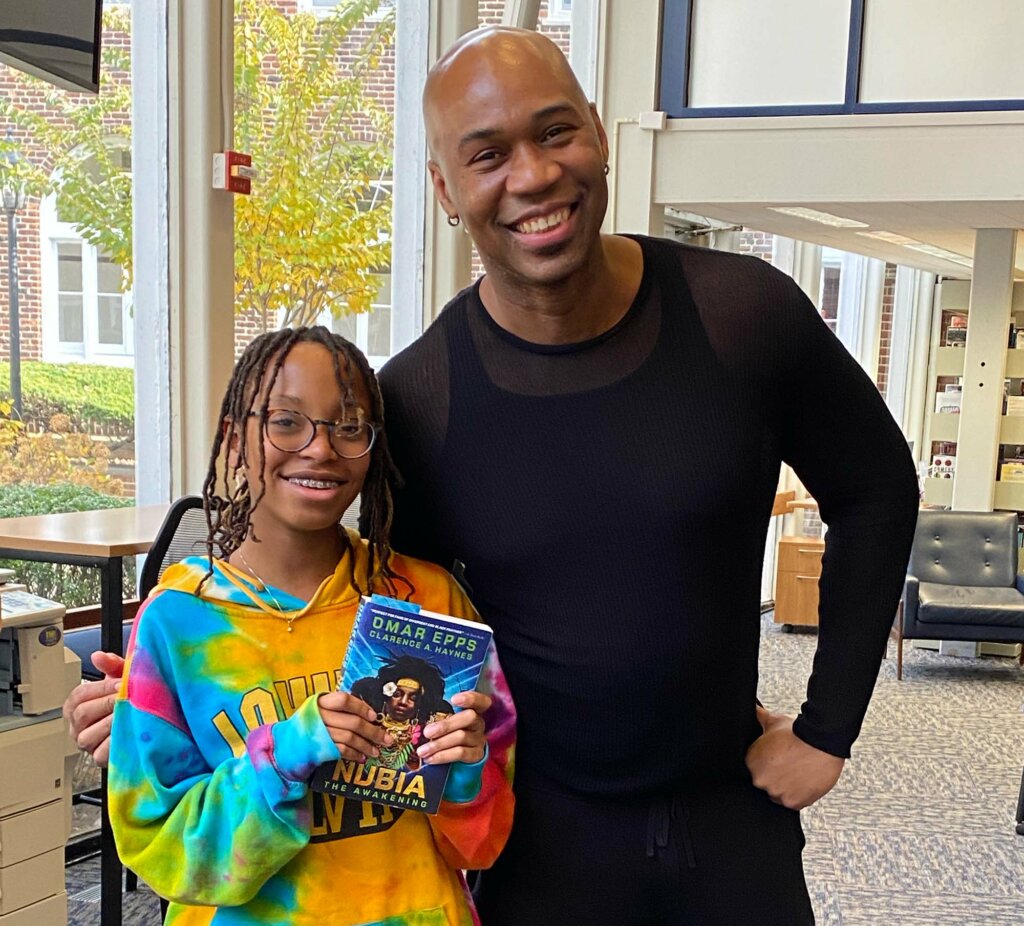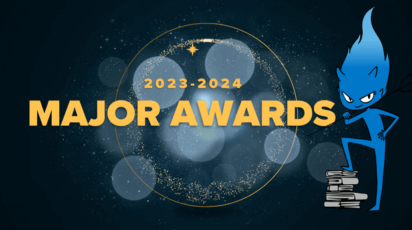News
Author Clarence Haynes Discusses Novel, Storytelling, and Finding Inspiration
What makes dystopian novels so appealing? This was one of the questions raised during the discussion of the Afro-futuristic novel, Nubia: The Awakening (2022) co-authored by Clarence Haynes and actor Omar Epps. Haynes visited with Middle and Upper School students on November 17.
Publishing & Writing Career
With an extensive background in the industry, Haynes offered students a glimpse into the world of publishing and the professionals who collaborate to get a book on library and store shelves. He described the different types of editors such as developmental editors who help flesh out ideas with writers, production editors who proofread manuscripts, layout editors, cover designers, as well as publicity and marketing teams, among others, all working together so that a book is set up for success upon release. He also spoke about his own journey as an editor and freelance writer taking on numerous and varied projects over the years, imparting to his young audience that “whatever you end up doing [in your careers], professional relationships and reputation are important.” You want to be known as someone who “comes through.”

Nubia: The Awakening
Nubia: the Awakening is set in 2098 in a New York City that has been greatly altered by the effects of climate change, as well as economic inequality, and a drug culture that dictates the social structure of the city. It focuses on a small group of teenage African refugees who discover they have super powers. Magical and mystical elements are woven into the story that both he and Epps believe young people today will have to deal with in the future. Poly students have been studying science fiction and how present-day circumstances may inform the future.
English teacher Arnelle Williams accompanied her eighth grade literature class to Clarence Haynes’ author visit. She emphasized that while her students read numerous works by authors, “seldom do they get the opportunity to interact with a current author at Poly.” She said, “I believe it’s important for kids to experience an author sharing about why their work matters and Clarence certainly did that.”
Dystopia Sells
As the discussion opened, one student asked in terms of speculative fiction, why is there always a negative portrayal of the future? Dystopia sells. Haynes told students, books and films like The Hunger Games did enormously well – and publishers pay attention to what has worked. They often look at trends to help their bottom line. But on a more human level, sci-fi and fantasy, a future dystopian world often pulls readers in, Haynes said, “because it grapples with what our fears are now. It taps into current anxiety.” Along the same lines, a student remarked about the parallels between Margaret Atwood’s The Handmaid’s Tale and the recent overturning of Roe v. Wade. Drawing on this analogy and connecting to Nubia, Haynes talked about how the characters in his book are forced to deal with the climate crisis, “a situation brought about through no fault of their own,” but which they must face – much like current teens today. He expanded by saying there are other issues in the book that people may connect to, be it a “difficult family life or cultural legacies, how everyone must figure out how they will survive and thrive.”
Creating and Developing Characters
Everyone is different, but connection helps. Haynes talked about character development and how he enjoys incorporating a number of characters, in whom readers can “see a bit of themselves.” Each chapter of the novel is told from the perspective of a different character. Uzochi is an academic star who has his sights on reaching the sky where the privileged live. His cousin Lencho is having a hard time at home and turns to a gang. Zuberi, a fierce, female warrior, and the edgy villain, Sandra, round out the main protagonists. Haynes also responded to a question about how various factors play into how a character responds to certain situations. As an example regarding gender for instance, he said he and Epps purposely made one of the male characters more gentle, while the main female character is more aggressive.

Williams reflected on what Haynes described in terms of the art of crafting a story. “He emphasized that building a story starts with not dreaming about the imaginary, but rather focusing on what one keeps coming back to in the real and ordinary. What is it that takes up most of our time and why? From that point, one begins to imagine the exaggerated, which in hindsight tends to not be so. For instance, Clarence [Haynes], in partnership with actor Omar Epps (how amazing!) were invested in social issues that affect many Black and brown teenagers in New York City. They dreamed up a world in which ‘sky people’ have more privilege and those ‘on the ground’ don’t because of the quality of air and other climate issues. The ideation came from the real, present moments.”
Dystopian World & Finding Inspiration
In terms of writing Nubia, a student asked if he created his world first and then the characters. Haynes stressed how important it is to establish the “rules” of the world one is creating so that the story unfolds in a consistent manner. Haynes also encouraged students to write about an idea that really excites oneself. He told students that he’s a firm believer that whether it’s an assignment or a personal passion, if you write what truly interests you, the result will be a success. You can be proud when you write something heartfelt and with a level of excellence. “Fantasy,” he noted, “can serve as a metaphor for life.” One of his favorite authors is Octavia Butler, the trailblazing, Black sci-fi writer. He’s also been enjoying the television series, The Foundation. Haynes’ latest installment, Nubia: The Reckoning, was published this year.
Reflections on Author Visit
After the students dispersed, Haynes stayed and talked to faculty, staff, and one student who had some questions about working through writer’s block and who solicited thoughtful feedback on her own writing. He advised her to try to focus on editing one or two pieces of content at a time rather than trying to edit several at once, which can be overwhelming. “Mr. Haynes provided several strategies for me, some of which I have used already,” said Savannah Parks ’28. “He also suggested sharing my work with adults or friends who could help me edit it if I wasn’t happy with the result. Throughout the entire conversation he was extremely supportive and understanding.”
“Clarence’s candor was refreshing,” said Williams, “And I loved how my students asked him questions about his favorite characters in the Nubia series. They were curious and engaged, which speaks to how effective author visits are to middle schoolers.




